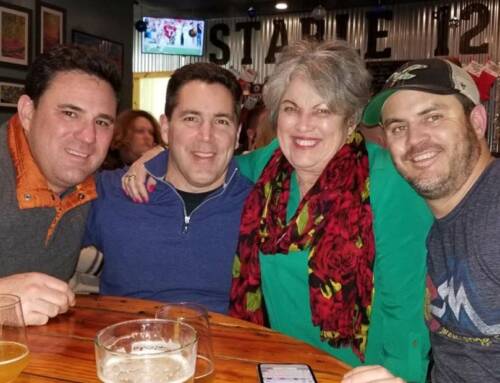After his wife’s death in 2011, John Grove was doing well living on his own in western Pennsylvania. It wasn’t until a week before his 85th birthday, when he suffered a heart attack, that things began to change.
Following successful quadruple bypass surgery in an Erie, PA, hospital, his daughter, Debra Grove-Mahoney, M.D., was hopeful he was fine. But his cardiac surgeon warned her that patients of John’s age could quickly experience vascular dementia after surgery. This type of dementia leads to problems with reasoning, judgement, memory and other thought processes caused by brain damage from impaired blood flow to the brain.
“When dad woke up from the anesthesia, he had a breathing tube in, and he was still giving orders [to the nurses],” Debra said. “We thought we had dodged a bullet.”
Six weeks after surgery, however, John started having problems thinking clearly. He drove across the state with his dog in the middle of the night, arriving at Debra’s home at 8 a.m. after having an argument with his neighbor/friend, a retired nurse.
Debra thought it was best that John stay at her house for a few weeks until he finished his cardiac rehabilitation. Then, he could return home. Debra realized his memory was failing, however, when he would ask for breakfast several times an hour, even after eating.
“He had a workup to see if it was delirium or dementia, but then things went rapidly downhill,” she said. “We realized dad wasn’t going to be able to live at home on his own. That’s when [my husband and I] decided to build an addition onto our house.”
The living situation worked well for over a year, but eventually, John needed more help. He didn’t want to get out of bed or shower, and he was frequently incontinent. Debra hired a nurse to come to the house a few times a week. But, even that was not enough. That’s when Debra, a pathologist at Lancaster General Hospital, sought advice from her close friend, Danielle Berardi, who happens to be the outreach coordinator for Masonic Village Hospice.
Danielle was unsure if John would qualify for hospice, but following a physical evaluation, he was approved for the service. Hospice sent an aide to Debra’s home to provide companionship and assistance.
“[Using hospice services] allowed us to keep dad in our home for at least another six to nine months,” Debra said. “The staff took unbelievable care of him. They were always there if we had questions.”
After some time, John would wake up in the middle of the night to go to the bathroom. He would have accidents on the floor and subsequently slip and fall. John was admitted to the Masonic Health Care Center at Masonic Village at Elizabethtown and continued with Hospice there until his physical condition had improved and he graduated from Hospice.
“He was doing well for a while. I didn’t know his health was failing again until one day, the doctor called me and said, ‘We think he’s starting the early stages of dying,’” Debra said.
At the end of his life, John was readmitted to Hospice and passed away in January 2021 at the age of 89. Debra said Hospice services were invaluable during her father’s health journey.
“I never felt like I was alone,” she said. “I felt completely supported, and they cared so much for my dad. At first, I felt guilty for bringing Hospice in. Everybody’s impression of hospice is that they help you die. It was NOT that experience. They took such good care of him physically, that it allowed us to keep him at home a lot longer than we would have been able to do on our own.”
John was extremely bright growing up, eventually becoming a civil engineer. He earned a master’s degree in engineering and was only a few courses shy of a Ph.D. He worked for the United States Steel Corporation in the oil works division in Oil City, PA, and he held numerous patents in his name. He also taught engineering courses part-time at Youngstown State University.
John and his wife, Alberta, met in college at Penn State University. Both John and his friend wanted to ask Alberta out on a date, so they flipped a coin, and John lost. But that didn’t deter him. He asked Alberta out anyway, and she agreed. At the time, she was engaged to someone else, Debra said, but it all worked out in the end.
The couple spent a few years at Penn State and later got married. Both John and Alberta dropped out of college when John’s father had open heart surgery. They moved in with his parents for a short time before completing their degrees at Youngstown State. At that point, they were already working, John in engineering and Alberta as an elementary educator.
John and Alberta wintered two months a year in Myrtle Beach, where John was active in several golf leagues. Alberta and their dog would sit under a tree while he played golf. Then they would go to dinner and drive back home.
Alberta also had heart problems, suffering from an acute myocardial infarction at age 46 and undergoing quadruple bypass in 1986. She was 77 when she died from complications from a urinary tract infection and sepsis.
“My dad loved animals, especially his little poodle,” Debra said. “That little dog kept him alive after my mom died.”
John and Alberta were married for 58 years and had three children.
Hospice made it possible for Debra and her siblings to spend extra time with her father, a gift every family deserves.




